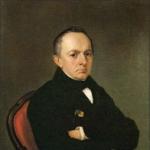Biography
Born May 18, 1787 in Vologda. He came from an ancient noble family, father - Nikolai Lvovich Batyushkov (1753-1817). He spent the years of his childhood in the family estate - the village of Danilovskoye. At the age of seven, he lost his mother, who suffered from mental illness, which was inherited by Batyushkov and his older sister Alexandra.
In 1797 he was sent to the St. Petersburg guesthouse Zhakino, from where in 1801 he moved to the Tripoli guesthouse. In the sixteenth year of his life (1802), Batyushkov left the boarding school and began reading Russian and French literature. At the same time, he became close friends with his uncle, the famous Mikhail Nikitich Muravyov. Under his influence, he studied the literature of the ancient classical world and became an admirer of Tibull and Horace, whom he imitated in his first works. In addition, under the influence of Muravyov Batyushkov developed a literary taste and aesthetic flair.
In St. Petersburg, Batyushkov met representatives of the then literary world. He became especially close with, N. A. Lvov, A. N. Olenin,. In 1805, his poem "Message to My Poems" was published in the Novosti Literature magazine, Batyushkov's first appearance in print. Having entered the department of the Ministry of Public Education, Batyushkov became close to some of his colleagues, who adjoined the Karamzin direction and founded the "Free Society of Literature Lovers".
In 1805, his poem "Message to My Poems" was published in the Novosti Literature magazine, Batyushkov's first appearance in print.
In 1807 Batyushkov enrolled in the people's militia (militia) and took part in the Prussian campaign. In the battle of Heilsberg, he was wounded and had to go to Riga for treatment. The following year, 1808, Batyushkov took part in the war with Sweden, after which he retired and went to his relatives, in the village of Khantonovo, Novgorod province. In the village, he soon began to get bored and rushed to the city: his susceptibility became almost painful, more and more he was seized by spleen and a premonition of future madness.
At the very end of 1809, Batyushkov arrived in Moscow and soon, thanks to his talent, bright mind and kind heart, he found good friends in the best areas of the then Moscow society. Of the writers there, he became closest to V. L. Pushkin, and. The years 1810 and 1811 passed for Batyushkov partly in Moscow, where he had a pleasant time, partly in Khantonov, where he was moping. Finally, having received a resignation from military service, at the beginning of 1812 he went to St. Petersburg and, with the help of Olenin, entered the service of the Public Library; his life settled down quite well, although he was constantly disturbed by the thought of the fate of his family and himself: an early promotion could not be expected, and economic affairs were going from bad to worse.
Meanwhile, Napoleon's army entered the borders of Russia and began to approach Moscow. Batyushkov again entered military service and, as an adjutant to General Raevsky, together with the Russian army, made the campaign of 1813-1814, which ended with the capture of Paris.
Staying abroad had a great influence on Batyushkov, who first became acquainted with German literature there and fell in love with it. Paris and its monuments, libraries and museums, too, did not pass without a trace for his impressionable nature; but he soon felt a strong homesickness and, having visited England and Sweden, returned to St. Petersburg. A year later, he finally quit military service, went to Moscow, then to St. Petersburg, where he entered Arzamas and took an active part in the activities of this society.
In 1816-1817 Batyushkov prepared for publication his book "Experiments in Poetry and Prose", which Gnedich then published. The book was well received by critics and readers.
In 1818, Batyushkov achieved his long-desired goal: he was appointed to serve in the Neapolitan Russian mission. A trip to Italy was always Batyushkov's favorite dream, but, having gone there, he almost immediately felt unbearable boredom, melancholy and melancholy. By 1821, hypochondria had taken such proportions that he had to leave the service and Italy.
In 1822, a mental disorder expressed itself quite definitely, and since then Batyushkov suffered for 34 years, almost never regaining consciousness, and finally died of typhus on July 7, 1855 in Vologda; buried in the Spaso-Prilutsky Monastery, five miles from Vologda. Back in 1815, Batyushkov wrote the following words about himself to Zhukovsky: “From birth, I had a black spot on my soul, which grew, grew with age and almost blackened my whole soul”; the poor poet did not foresee that the spot would not stop growing and so soon completely darken his soul.
Addresses in St. Petersburg
Summer 1812 - Balabin's tenement house (18 Bolshaya Sadovaya Street);
spring 1813 - Batashov's house (Vladimirskaya st., 4);
May - July 1813 - the house of Sievers (Pochtamtskaya st., 10);
the end of 1814 - February 1815 - the house of E. F. Muravyova (25 Fontanka River Embankment);
August - November 1817 - the house of E. F. Muravyova (25 Fontanka River Embankment);
1818 - the house of E. F. Muravyova (25 Fontanka River Embankment);
spring 1822 - hotel "Demut" (emb. river Moika, 40);
May - June 1823 - the house of E. F. Muravyova (25 Fontanka River Embankment);
November 1823 - May 1824 - Imsen apartment building (Ekaterininsky Canal Embankment, 15).
Creation
Batyushkov is considered the immediate predecessor, and not by chance - combining the literary discoveries of classicism and sentimentalism, he was one of the founders of the new, "modern" Russian poetry.
The poems of the first period of the poet's literary activity are imbued with epicureanism: the man in his lyrics passionately loves earthly life; the main themes in Batyushkov's poetry are friendship and love. Rejecting moralism and mannerisms of sentimentalism, he finds new ways of expressing feelings and emotions in verse, extremely bright and vital:
Slender camp, entwined around
Hops yellow crown,
And flaming cheeks
Roses bright purple
And the mouth in which melts
purple grapes -
Everything in frantic seduces!
Fire and poison pours in the heart!
In response to the events of the Patriotic War of 1811, Batyushkov created samples of civil poetry, the patriotic mood of which is combined with a description of the author's deeply individual experiences:
... while on the field of honor
For the ancient city of my fathers
I will not bear the victim of revenge
And life and love for the motherland;
While with a wounded hero,
Who knows the way to glory
Three times I will not put my chest
Before enemies in close formation -
My friend, until then I will
All are alien to muses and charities,
Wreaths, with the hand of love retinue,
And noisy joy in wine!
In the post-war period, Batyushkov's poetry gravitates towards romanticism. The subject of one of his most famous poems, "The Dying Tass" (1817), is the tragic fate of the Italian poet Torquato Tasso
Do you remember how many tears I shed as a baby!
Alas! since then the prey of evil fate,
I learned all the sorrows, all the poverty of being.
Fortune pitted abysses
Opened under me, and the thunder did not stop!
Driven from country to country, driven from country to country,
I searched in vain for shelter on earth:
Everywhere her finger is irresistible!
(1787-1855), Russian poet. The head of the anacreontic trend in Russian lyrics ("Merry Hour", "My Penates", "Bacchae"). Later he experienced a spiritual crisis ("Hope", "To a friend"); in the genre of elegy - motifs of unrequited love ("Separation", "My Genius"), high tragedy ("Dying Tass", "Melchizedek's Saying").
BATYUSHKOV Konstantin Nikolaevich, Russian poet.
Childhood and youth. Service start
Born into an old but impoverished noble family. Batyushkov's childhood was overshadowed by the death of his mother (1795) from hereditary mental illness. In 1797-1802 he studied at private boarding schools in St. Petersburg. From the end of 1802, Batyushkov served in the Ministry of Public Education under the leadership of M. N. Muravyov, a poet and thinker who had a profound influence on him. When war was declared against Napoleon, Batyushkov joined the militia (1807) and took part in a campaign in Prussia (he was seriously wounded near Heilsberg). In 1808 he took part in the Swedish campaign. In 1809 he retired and settled in his estate Khantonovo Novgorod province.
The beginning of literary activity
Batyushkov's literary activity begins in 1805-06 with the publication of a number of poems in the journals of the Free Society of Lovers of Literature, Sciences and Arts. At the same time, he draws closer to the writers and artists who were grouped around A. N. Olenin (N. I. Gnedich, I. A. Krylov, O. A. Kiprensky and others). The Oleninsky circle, which set itself the task of resurrecting the ancient ideal of beauty on the basis of the latest sensibility, opposed itself both to the Slavic archaism of the Shishkovists (see A. V. Shishkov), and the French orientation and the cult of knick-knacks common among Karamzinists. Batyushkov's satire "Vision on the banks of the Lethe" (1809), directed against both camps, becomes the literary manifesto of the circle. In the same years, he began to translate T. Tasso's poem "Jerusalem Liberated", entering into a kind of creative competition with Gnedich, who translated Homer's Iliad.
"Russian Guys"
Batyushkov's literary position undergoes some changes in 1809-10, when he draws closer in Moscow to the circle of younger Karamzinists (P. A. Vyazemsky, V. A. Zhukovsky), gets acquainted with N. M. Karamzin himself. Poems of 1809-12, including translations and imitations of E. Parny, Tibullu, a cycle of friendly messages ("My Penates", "To Zhukovsky") form the image of the "Russian Guy" - an Epicurean poet, singer, that determines all further Batyushkov's reputation laziness and lust. In 1813, he wrote (with the participation of A. E. Izmailov) one of the most famous literary and polemical works of Karamzinism, The Singer or Singers in the Conversation of the Slavic Russians, directed against the Conversations of Lovers of the Russian Word.
fracture
In April 1812, Batyushkov entered the St. Petersburg Public Library as an assistant curator of manuscripts. However, the outbreak of war with Napoleon prompts him to return to military service. In the spring of 1813 he went to Germany to the active army and reached Paris. In 1816 he retired.
Military upheavals, as well as the unhappy love experienced during these years for the pupil of the Olenins A.F. Furman, lead to a profound change in Batyushkov's worldview. The place of the "small philosophy" of Epicureanism and worldly pleasures is occupied by conviction in the tragedy of being, which finds its only solution in the poet's faith in the afterlife reward and the providential meaning of history. A new complex of moods permeates many of Batyushkov's poems of these years ("Hope", "To a Friend", "Shadow of a Friend") and a number of prose experiments. At the same time, his best love elegies dedicated to Furman were created - "My Genius", "Separation", "Tavrida", "Awakening". In 1815, Batyushkov was admitted to Arzamas (under the name Achilles, associated with his former merits in the fight against archaists; the nickname often turned into a pun, playing on Batyushkov’s frequent illnesses: “Ah, sickly”), but disappointed in literary controversy, the poet did not played an important role in society.
"Experiments in verse and prose". Translations
In 1817 Batyushkov completed a cycle of translations "From the Greek Anthology". In the same year, the two-volume edition "Experiments in Poetry and Prose" was published, in which Batyushkov's most significant works were collected, including the monumental historical elegies "Hesiod and Omir, Rivals" (an alteration of the elegy by Ch. Milvois) and "The Dying Tass ", as well as prose writings: literary and artistic criticism, travel essays, moralizing articles. "Experiments ..." strengthened Batyushkov's reputation as one of the leading Russian poets. The reviews noted the classical harmony of Batyushkov's lyrics, which related Russian poetry to the muse of southern Europe, primarily Italy and Greco-Roman antiquity. Batyushkov also owns one of the first Russian translations by J. Byron (1820).
 Mental crisis. Last verses
Mental crisis. Last verses
In 1818 Batyushkov was appointed to the Russian diplomatic mission in Naples. A trip to Italy was a long-term dream of the poet, but the heavy impressions of the Neapolitan revolution, service conflicts, and a sense of loneliness lead him to an increase in mental crisis. At the end of 1820, he seeks a transfer to Rome, and in 1821 he goes to the waters in Bohemia and Germany. The works of these years - the cycle "Imitation of the Ancients", the poem "You are awakening, O Baia, from the tomb ...", the translation of a fragment from "The Messinian Bride" by F. Schiller are marked by increasing pessimism, the conviction that beauty is doomed in the face of death and the ultimate unjustification of the earthly existence. These motives culminated in a kind of poetic testament of Batyushkov - the poem "Do you know what he said, / saying goodbye to life, gray-haired Melchizedek?" (1824).
Disease
At the end of 1821, Batyushkov developed symptoms of hereditary mental illness. In 1822 he went to the Crimea, where the disease worsened. After several suicide attempts, he is placed in a psychiatric hospital in the German city of Sonnestein, from where he is discharged for complete incurability (1828). In 1828-33 he lived in Moscow, then until his death in Vologda under the supervision of his nephew G. A. Grevens.
In a prosperous noble family in Vologda, on May 18, 1787, the boy Kostya was born - Konstantin Batyushkov. His childhood would have been cloudless if not for the early death of his mother. It took place in the cozy estate of the father. The boy had nannies, tutors and home teachers, so that the upbringing and education of the child was well organized.
From infancy, he was taught to read books, encouraged curiosity, craving for knowledge. At home they spoke not only Russian, but also very fluently - in French. However, this was the case at that time in any noble family. Therefore, the boy, of course, began to speak in both languages.
Then he was assigned to St. Petersburg private boarding schools (1797 - 1802), where Konstantin perfectly mastered several foreign languages, delved into the study of literature, ancient culture, got acquainted with the basics of philosophy and began to write poetry himself. The upbringing of Konstantin during this period was led by his uncle M. N. Muravyov, a writer and public figure, the father of the future Decembrists. The boy loved his patron and trusted him, and under his influence, from a young age he was seized by an ardent and noble desire to improve the world.
Batyushkov's first steps in literature
While serving in the Ministry of Public Education, where some young writers also worked, Batyushkov met N. I. Gnedich and became friends with him. This friendship also influenced the formation of the young poet. Both of them were keenly interested in antiquity, its culture, and especially poetry. Thanks to Nikolai Gnedich, who later became famous for the classic translation of Homer's Iliad, Batyushkov became a member of the Free Society of Lovers of Literature, Sciences and Arts, at the same time he first published his poems in the Moscow magazine News of Russian Literature. Then it seemed that the path to literature was open, and now only the life of a young poet would be devoted to it.
At war with Napoleon
But in Europe, the war with Napoleon began. Russia as an ally participated in the fight against the French. Overwhelmed by patriotic impulses, in 1807 Batyushkov volunteered to join the militia. Participating in the battle near Heilsberg (Prussia), he was seriously wounded and sent for treatment to Riga. After recovering, he again went to the war, but this time to the Russian-Swedish war, to Finland.
There he again proved himself a fearless and faithful warrior. But it is interesting that in the article "From the letters of a Russian officer about Finland", written then by Batyushkov, the reader found wonderful descriptions of the beauties of northern nature - and nothing more. He wrote about the land of blue lakes and rocks, about the gloominess of dense forests, about the amazing variability of the color of the Finnish sky. Even under his military uniform, the sensitive soul of the poet trembled.
Beginning of the Patriotic War of 1812 Batyushkov missed due to illness. But then he again changed the pen to the weapon. After the flight of the Napoleonic army, he saw the devastated Moscow and for the second time went to war with Napoleon, participated in the historic battle of Leipzig, entered Paris as part of the Russian army, witnessed the surrender in the capital of France.
Literary activity Batyushkov
In the intervals between the wars, Batyushkov agreed in common interests and activities with V. Zhukovsky, N. Karamzin, V. Pushkin (the uncle of the great poet), P. Vyazemsky. He entered into a literary discussion with A. Shishkov's group, which planted extinct forms of Russian speech in literature. Konstantin Nikolaevich rejected their ideas, arguing that the literary language should be natural and free to reveal living feelings.
About this he wrote his famous satire "Vision on the banks of the Lethe", after which Batyushkov became the subject of controversy in literary circles. He was talked about as a promising talent. Then there were years filled with intensive work in the literary field. He joined the Arzamas group, wrote the program "Speech on the influence of light poetry on the language", historical and philosophical elegies, such as "Crossing the Neman", "Dying Tass" and several others, released "Experiments in verse and prose". This confirmed the poet in the forefront of the leaders of Russian literature.
Illness and death of Batyushkov
And then it was all over for the poet. He was crippled by a hereditary disease (mother died of mental illness). Literary activity was out of the question. He was treated for a long time, for four years he was in a clinic for the mentally ill. But when there was no hope of recovery, Batyushkov was transferred to his homeland, to his father's estate. In this helpless state, he lived there for more than twenty years. But even in his madness he was self-absorbed, a quiet dreamer, talking about the beauty of the Italian language, about art and nature. Died of typhus in July 1855.
5435 0
BATYUSHKOV Konstantin Nikolaevich, Russian poet.
Childhood and youth. Service start
Born into an old but impoverished noble family. Batyushkov's childhood was overshadowed by the death of his mother (1795) from hereditary mental illness. In 1797-1802 he studied at private boarding schools in St. Petersburg. From the end of 1802, Batyushkov served in the Ministry of Public Education under the leadership of M. N. Muravyov, a poet and thinker who had a profound influence on him. When war was declared against Napoleon, Batyushkov joined the militia (1807) and took part in the campaign against Prussia (he was seriously wounded near Heilsberg). In 1808 he took part in the Swedish campaign. In 1809 he retired and settled in his estate Khantonovo Novgorod province.
The beginning of literary activity
Batyushkov's literary activity begins in 1805-1806 with the publication of a number of poems in the journals of the Free Society of Lovers of Literature, Sciences and Arts. At the same time, he draws closer to the writers and artists who were grouped around A. N. Olenin (N. I. Gnedich, I. A. Krylov, O. A. Kiprensky and others). The Oleninsky circle, which set itself the task of resurrecting the ancient ideal of beauty on the basis of the latest sensibility, opposed itself both to the Slavic archaism of the Shishkovists (see A. V. Shishkov), and the French orientation and the cult of knick-knacks common among Karamzinists. Batyushkov's satire "Vision on the banks of the Lethe" (1809), directed against both camps, becomes the literary manifesto of the circle. In the same years, he began translating T. Tasso's poem Jerusalem Liberated, entering into a kind of creative competition with Gnedich, who translated Homer's Iliad.
"Russian Guys"
Batyushkov's literary position undergoes some changes in 1809-1810, when he draws closer in Moscow to the circle of younger Karamzinists (P. A. Vyazemsky, V. A. Zhukovsky), gets acquainted with N. M. Karamzin himself. Poems of 1809-1812, including translations and imitations of E. Parny, Tibullu, a cycle of friendly messages (“My Penates”, “To Zhukovsky”) form the image of the “Russian Guy” - an Epicurean poet, singer, that determines all further Batyushkov's reputation laziness and lust. In 1813, he wrote (with the participation of A. E. Izmailov) one of the most famous literary and polemical works of Karamzinism, The Singer or Singers in the Conversation of the Slavic Russians, directed against the Conversations of Lovers of the Russian Word.
In April 1812, Batyushkov entered the St. Petersburg Public Library as an assistant curator of manuscripts. However, the outbreak of war with Napoleon prompts him to return to military service. In the spring of 1813 he went to Germany to the active army and reached Paris. In 1816 he retired.
Military upheavals, as well as the unhappy love experienced during these years for the pupil of the Olenins A.F. Furman, lead to a deep change in Batyushkov's worldview. The place of the “little philosophy” of Epicureanism and worldly pleasures is occupied by conviction in the tragedy of being, which finds its only solution in the poet’s faith in the afterlife reward and the providential meaning of history. A new complex of moods permeates many of Batyushkov's poems of these years ("Hope", "To a Friend", "Shadow of a Friend") and a number of prose experiments. At the same time, his best love elegies dedicated to Furman were created - “My Genius”, “Separation”, “Tavrida”, “Awakening”. In 1815, Batyushkov was admitted to Arzamas (under the name Achilles, associated with his past merits in the fight against archaists; the nickname often turned into a pun, playing on Batyushkov’s frequent illnesses: “Ah, sickly”), but disappointed in literary controversy, the poet did not played an important role in society.
"Experiences in Poetry and Prose". Translations
In 1817 Batyushkov completed a series of translations from the Greek Anthology. In the same year, the two-volume edition “Experiments in Poetry and Prose” was published, in which Batyushkov’s most significant works were collected, including the monumental historical elegies “Hesiod and Omir, Rivals” (an alteration of the elegy by Ch. Milvois) and “The Dying Tass ”, as well as prose writings: literary and artistic criticism, travel essays, moralizing articles. "Experiments ..." strengthened Batyushkov's reputation as one of the leading Russian poets. The reviews noted the classical harmony of Batyushkov's lyrics, which related Russian poetry to the muse of southern Europe, primarily Italy and Greco-Roman antiquity. Batyushkov also owns one of the first Russian translations by J. Byron (1820).
Mental crisis. Last verses
In 1818 Batyushkov was appointed to the Russian diplomatic mission in Naples. A trip to Italy was a long-term dream of the poet, but the heavy impressions of the Neapolitan revolution, service conflicts, and a sense of loneliness lead him to an increase in mental crisis. At the end of 1820, he seeks a transfer to Rome, and in 1821 he goes to the waters in Bohemia and Germany. The works of these years - the cycle "Imitation of the Ancients", the poem "You are awakening, O Baia, from the tomb ...", the translation of a fragment from F. Schiller's "The Messinian Bride" are marked by increasing pessimism, the conviction that beauty is doomed in the face of death and the ultimate unjustification of the earthly existence. These motives culminated in a kind of poetic testament of Batyushkov - the poem "Do you know what you said, / saying goodbye to life, gray-haired Melchizedek?" (1824).
At the end of 1821, Batyushkov developed symptoms of hereditary mental illness. In 1822 he went to the Crimea, where the disease worsened. After several suicide attempts, he is placed in a psychiatric hospital in the German city of Sonnestein, from where he is discharged for complete incurability (1828). In 1828-1833 he lives in Moscow, then until his death in Vologda under the supervision of his nephew G. A. Grevens.




















